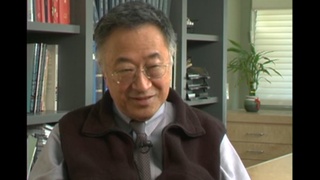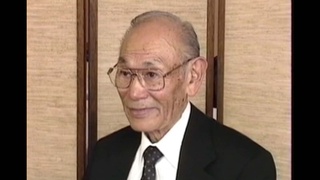Interviews
Californians didn't know about evacuation
You would think most Americans would’ve known, but even people in California didn’t know what happened to the Japanese Americans. It seemed like, you know, they disappeared. And I don’t think the American papers really played up where the Japanese were taken to and that they could only carry just what they could carry, which was very minimal. And I know people in our home town, I mean, we grew up in San Pedro. And yet, when we came back they said, “Oh! Where did you Japanese go? You all disappeared somewhere!” And, I don’t think they realized what this government had done, you know, to put the Japanese people away.
And they may have said it was for our safety, when it wasn’t so—it was almost like a punishment being Japanese and being taken in the same way as they thought of the Japanese from Japan—the enemy. We were—70 percent of us who went into camp—were Americans, I mean we were American citizens, and the rest of them were the Issei‘s born in Japan who America never allowed to be citizens.
Date: June 16, 2003
Location: California, US
Interviewer: Karen Ishizuka, Akira Boch
Contributed by: Watase Media Arts Center, Japanese American National Museum.
Explore More Videos

Anti-Japanese sentiment at the time of World War II
(b. 1918) Issei businessman in Canada


Lack of political power led to camps
(1924-2018) Researcher, Activist

The Perspective of Youth
(1923–2006) Community activist. Co-founded the Manzanar Committee

Choice to move east or go to Japan
(b.1920) Japanese Canadian Nisei. Established the Ikenobo Ikebana Society of Toronto


Institutionalization as a bad aspect of camp
(1924-2018) Researcher, Activist

State Department records show concern for treatment of Japanese American internees
(1924-2018) Researcher, Activist

Different tension between East Coast and Los Angeles
Japanese American Creative designer living in Japan

Remembering December 7, 1941
(1923-2011) Lawyer, MIS veteran, founder of Francis and Sarah Sogi Foundation

Meeting Japanese Americans from the mainland in MIS
(1923-2011) Lawyer, MIS veteran, founder of Francis and Sarah Sogi Foundation

Awareness of concentration camps as a Japanese American
(1923-2011) Lawyer, MIS veteran, founder of Francis and Sarah Sogi Foundation

His experiences in Chicago after WWII
(b.1929) Pioneer medical researcher in tissue transfer and organ transplantation.

Manhunt
(1919 - 2005) Challenged the constitutionality of Executive Order 9066.

The Final Verdict
(1919 - 2005) Challenged the constitutionality of Executive Order 9066.
